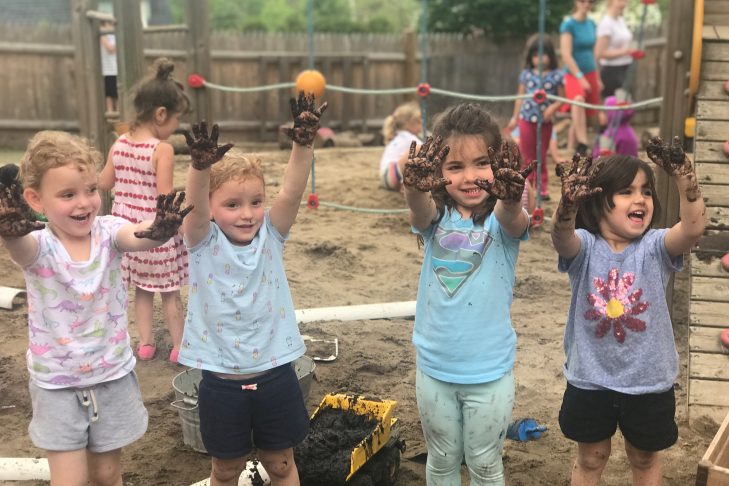Spring at the Temple Shalom Nursery School is marked by many exciting changes: renewing our gardens, playing with water, observing blossoming trees, returning birds, bees and butterflies and spending more time in the outdoor classroom.
For me, springtime is also a time of meeting with prospective families. I am excited to welcome them to school. Every conversation is an opportunity for new connections. During visits, parents are impressed by the bright classrooms, thoughtful outdoor space and many examples of our dedication to nature-rich explorations and Jewish values. It is not as easy, however, to show what goes on beyond the events, activities and materials. I invite visitors to observe in the classrooms with hopes that they will see the depth of respect for the children, the quality of relationships and the unique approach to education. These observations can be insightful.
One parent noted: “How is it possible that you have 18 children in the classroom playing so quietly? I don’t think my child would be able to do this—he is full of energy and loud all the time!”
This mother observed exploration time in the parparim classroom. Children happily played and conversed in small groups in different areas of the classroom. Three children in the block area worked together, building a “presents-making machine.” They added blocks to the structure while explaining their ideas: “This is the window for the presents to come out. This is the part which opens and closes when you put money in. This will be the moving thing for the present to go from here to there.”
Two children worked at the “inventors’ table,” constructing a transformer out of a pizza box. Four children worked on their potions of paint and water. Another four children molded clay and embellished their sculptures with sparkling beads. Two children were busy playing “sisters” in their “home” created with pillows and blankets. Finally, three children were sitting with a teacher, discussing the book they just read at circle time while other teachers joined the “inventors” and the “builders” to support their creative process.
What was not immediately visible to the eye was the thoughtful planning that preceded these playful explorations and the consistent effort of our teachers to develop close relationships with their students and to understand their personalities, interests and drives. Based on their knowledge of the children, teachers make careful considerations about the organization of their classroom, as well as their daily routines, materials, books and activities.
Teachers’ decisions empower every student. Children are able to decide what materials and toys to explore, who to partner with and how to plan and design their play. In addition, children know that their play will be respected, protected from interruptions and supported. By feeling in control, children experience a deep engagement with their chosen activity. On the level of neurons, such engagement creates a “brain in flow” (an idea proposed by psychologist Mihaly Csikszentmihaly), a state of total concentration resulting in joy and peak performance.
After this observation, I assured the surprised parent: “What you see is an example of children engaged in their projects, not just entertained by toys, materials or peers. Children remain their wonderful selves, active and loud, but they learn to organize and channel their energy to achieve goals, which they established for themselves.”
When children experience this “flow,” they focus their attention, observe their own thinking and collaborate. These skills are foundational for future academic success. “Flow” is experienced again and again when children save their work and keep returning to the same project over periods of days and weeks. They exercise persistence and experience great joy when they overcome challenges and bring their vision to life.
As educators, we try to share our beliefs with prospective families. We are convinced that teaching is not equal to learning and knowing is not equal to understanding. We see children as active constructors of their knowledge, and we partner with children in this process. We encourage children not just to play, but to play deeply and immerse themselves in ideas, symbols, representations, arguments, relationships, listening and seeking solutions. Great play equals great learning.
Lucy Banerji is the director of Temple Shalom Nursery School, a nature-rich early childhood program for children 18 months and older. Full- and part-time enrollment for Fall 2019 is now available. Contact lbanerji@templeshalom.org for more information or to schedule a visit.
This post has been contributed by a third party. The opinions, facts and any media content are presented solely by the author, and JewishBoston assumes no responsibility for them. Want to add your voice to the conversation? Publish your own post here. MORE


